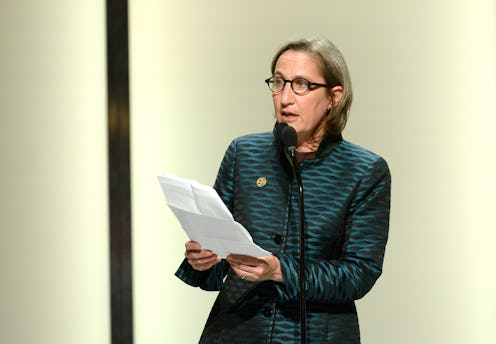News
This Law Professor Has A Message On Rape Culture
After Hillary Clinton lost last month's presidential election to Donald Trump, Michele Dauber says she spent many days crying. A professor of law at Stanford University and an advocate for victims of sexual assault, Dauber is understandably concerned about the potential effects of a Trump presidency on the women in the U.S. In the wake of Trump's election and other recent events, Dauber's perspective on rape culture can inspire and inform others about the vast work that needs to be done to prevent future acts of sexual violence.
A law professor, Dauber has years of experience with the criminal justice system and supporting victims of sexual assault —, but recently, her name popped up in a big way because of an incident that occurred particularly close to her. In March, Stanford student-athlete Brock Turner was found guilty on three counts of sexual assault charges by a jury. In June, he was controversially sentenced by a judge to just six months in a county jail, and by early September, Turner walked free. Largely because of the light sentence, the case earned national attention, shining a light on the challenges that exist to successfully prosecuting sexual assault cases and curbing the problem from the beginning.
Not only does Dauber teach law at the university where Turner studied and competed on the swim team, but according to Fusion, she is also a family friend of Turner's victim. In recent months, Dauber has become known as a representative for the young woman, who anonymously goes by Emily Doe.
Dauber's experience with the Turner case and others throughout her career has opened her eyes to some of the harshest realities of sexual assault as a public issue. "What I've learned from working on this case is that bias in sentencing in domestic violence is particularly terrible, and it's particularly terrible in the case of collegiate athletes, that's for sure," she says. So, what does someone who has seen the problems with investigating and prosecuting sexual assault cases up close and personally think can be done? Dauber's advice is obvious in the way she speaks and the work that she does.
One priority, according to Dauber, should be to make the college environment safer for women. "We really need to look at collegiate athletics, and we really need to look at fraternities... We really need to take a hard look at how to make fraternities safe for women, and if they can't be made safe, then we need to look at whether they have ongoing utility as an institution in the 21st century."
Dauber points to statistics that show the potential danger of Greek life on campus. For instance, men who join fraternities could be 300 percent more likely to commit rape than men who don't, and women in sororities are 74 percent more likely to experience a rape than women who don't. As for athletes, research shows that they're 23 percent less likely to receive a conviction for sexual assault than the general population.
Then, there's another important (and relevant) part of the college environment to be concerned with: Title IX.
Introduced in 1972, Title IX prohibits discrimination in university programs and activities on the basis of sex. It tasked the federal department of education's office for civil rights (OCR) with investigating sex-based complaints. Over the years, that has meant many investigations of sexual assault for OCR to handle, but according to Dauber, those investigations may not be enough.
"What the office for civil rights did and does was very important, but let's not overplay it," she tells Bustle. "They have 200 open investigations, and there are 5000 colleges in this country. Rape is happening everywhere, and they only have 200 investigations."
Dauber is working on a conference and strategy to preserve Title IX in the wake of Trump's impending presidency, but she clearly wants to go beyond politics. "We need to realize that criminal sentencing is something that happens at the state and local level, not at the federal level," she explains. "He can be president of anything he wants, but at the end of the day, when you go to court, it's happening in your county."
In her local community, Dauber has urged the removal of Judge Aaron Persky, who sentenced Turner. Shortly after Turner's sentence was handed down, Dauber wrote an opinion piece for The Washington Post that called for Persky's removal. She supports a campaign to recall Persky — and the campaign is accepting donations. On a broader scale, Dauber encourages the media to continue the conversation about sexual assault whenever possible and she urges individuals to hold each other accountable for such violence.
"We really need to hold people accountable, and it shouldn't matter if it's the president-elect of United States — the living embodiment of rape culture, by the way — or the president of Stanford, or Judge [Aaron] Persky. If you enable this behavior and don't hold people accountable, then we will hold you accountable," she says.
If there's a single call to action in Dauber's message, it's what she says she's going to do herself: "We are going to keep rolling forward." Turner will continue to live his life outside of jail, Trump will be inaugurated next month, but the work of advocates like Dauber will also continue. The call to action, then, is for others to join her conversation, to support campaigns like the judge recall initiative, and to hold peers accountable, from frat parties to the ivory tower.
Additional reporting by Anna Klassen.
